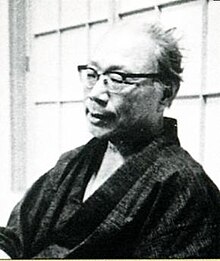Shūgorō Yamamoto
| Shūgorō Yamamoto | |
|---|---|

Shūgorō Yamamoto
|
|
| Born |
22 June 1903 Otsuki, Yamanashi, Japan |
| Died | February 14, 1967 (aged 63) Yokohama, Japan |
| Occupation | Writer |
| Genre | novels, short stories |
Shūgorō Yamamoto (山本 周五郎 Yamamoto Shūgorō?, June 22, 1903 – February 14, 1967) was the pen name of Satomu Shimizu (清水 三十六 Shimizu Satomu?), a Japanese novelist and short-story writer active during the Showa period of Japan. He was noted for his popular literature, and is known to have published works under at least fourteen different pen names.
Yamamoto was born in what is now Otsuki city in Yamanashi prefecture, to a family in impoverished circumstances. Lack of money forced him to drop out of secondary school, but he continued his education part-time, while living as a boarder above a used bookstore. His pen-name came from the name of the store where he lived.
Yamamoto's literary debut was with a short story called Sumadera fukin, and a stage drama in three acts, called Horinji iki, which were both published in 1926. His early works were aimed primarily at children. In 1932, he turned to popular stories for adults with Dadara Dambei, which received little serious notice from the literary world, so he continued to write popular detective stories and adventure stories for juvenile audiences. These included a series of short stories with samurai themes from 1940–1945, and stories on heroic historical women from 1942–1945, both themes being preeminently suitable for wartime Japan.
...
Wikipedia
